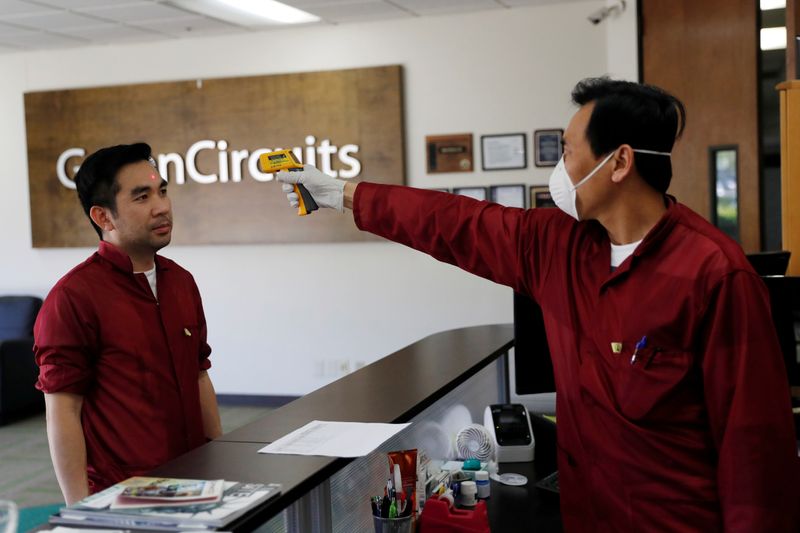By Caroline Humer
NEW YORK (Reuters) - U.S. companies are raising new questions about how they can make workplaces safe after the world’s top public health agency acknowledged the risk that tiny airborne droplets of the novel coronavirus may contribute to its spread, industry healthcare consultants said.
About two weeks ago, the World Health Organization called for more scientific study into airborne transmission of COVID-19. The move raised awareness of an issue excluded from U.S. government back-to-work guidelines, adding to the challenge of keeping people safe in offices, stores and work sites, these consultants said.
Many companies devised strategies based on WHO guidance that large respiratory droplets of the virus could infect people when first emitted and after they landed on surfaces. Now the concern over infection is focused on the idea that tiny droplets could linger in the air for hours.
Companies are reviewing if they have gone far enough with policies on mask-wearing, sealing off conference rooms and upgrading ventilation systems. Some, like retailers who have installed plexiglass barriers in their stores between cashiers and customers, are wondering what else they can do if the larger droplets those barriers aim to contain are just one piece of respiratory transmission, consultants said.
Neal Mills, chief medical officer at healthcare benefits group Aon (NYSE:AON), began fielding questions last week about the WHO’s decision to investigate aerosol transmission, and said employers were slowing the return of remote workers back to their offices.
"They are doing due diligence around how are you going to reduce the transmission of the virus in light of the proposed aerosol nature of COVID-19,” Mills said.
The slowdown comes as some employers, such as Texas energy companies Halliburton (NYSE:HAL) Co and Chevron Corp (NYSE:CVX), had already begun delaying plans to bring back office workers due to rising coronavirus cases.
Employers are asking whether public health recommendations that individuals remain 6 feet apart and wear masks to limit transmission through large droplets are enough.
They also wonder about air conditioning systems that do not have filtration systems and the effectiveness of plexiglass partitions against a virus floating in the air, said David Zieg, a lead consultant on clinical services at Mercer, another healthcare services companies.
Consultants are advising employers to go beyond their existing plans, which may also include temperature checks, health questionnaires and frequent restroom cleanings.
“The concept here is risk reduction. It’s not 100%. You add in all the little things you can to reduce the risk,” Zieg said.
Months after U.S. companies sent all but essential workers home due to the global new coronavirus pandemic, many are still struggling to bring their workforce back.
For some employers, the cost of not putting in effective precautions goes beyond that of workers missing days while they are sick. There are concerns about legal liability and healthcare costs, many of which are paid for by large employers.
Some corporations moved early and began integrating the possibility of airborne transmission of COVID-19 into their plans as evidence began emerging of transmission at indoor bars and restaurants.
General Motors Co (NYSE:GM), Ford Motor (NYSE:F) Co and Fiat Chrysler Automobiles NV maximized ventilation in their manufacturing facilities before restarting production on May 18 because of the potential for aerosol transmission, the companies said.
But others are more than halving the number of workers they bring back to the office to 10 percent of staff and rethinking how many people can safely ride in an elevator or attend an in-person meeting, Willis Towers Watson (NASDAQ:WLTW) health practice co-leader Jeff Levin-Scherz said.

“Once you start limiting how many people can be in a conference room, the imperative to bring some types of workers back to the office, if they have to attend meetings virtually anyway, is much lower,” Towers Watson’s Levin-Scherz said.